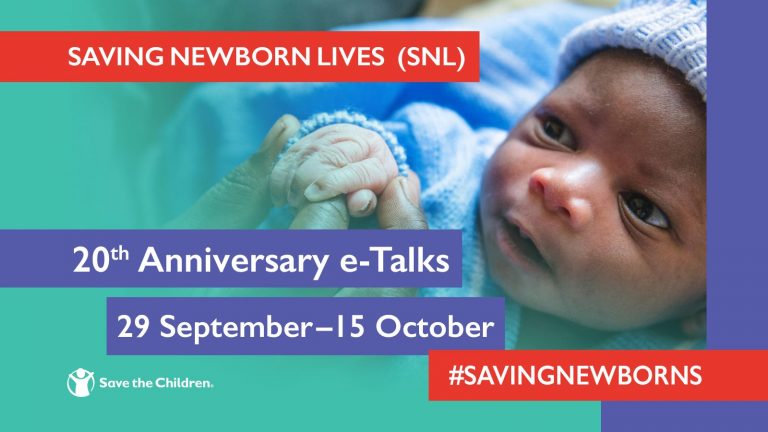Beginning in 2000 with a ground-breaking grant from the Bill and Melinda Gates Foundation, Saving Newborn Lives (SNL) marked the first newborn health program of its kind, elevating Save the Children’s contribution to the area of newborn health. It is an unprecedented legacy, shared with partners around the globe.
Save the Children’s 20-year SNL program invited the international community to reflect on the state of newborn health during the SNL Legacy e-Talks.
The e-Talks were a series of 12 sessions carried out from September 29 to October 15, 2020. Each day discussed two topics. Over 300 maternal and newborn health experts attended multiple sessions led by more than 45 panelists.
Day 1 reminisced about the history and lessons learnt. The speaker and panel moderator, David Oot, shared the anecdote on how he conceived of the SNL project with an idea scribbled on r a paper napkin. We heard from global and country stakeholders how SNL was instrumental in initiating the newborn health movement with multiple partners. We also heard about the donor Gates Foundation’s commitment and engagement to ensure the agenda of newborn health received the needed focus.
On Day 2, there were rich discussions around advances in measurement of newborn health and survival, including standardized indicators, which helped generate estimates for policymakers and key stakeholders, supporting evidence-based programming. The strides made in measurement of newborn health and survival enabled advocacy and policy change to improve indicators at the country level, supported by case studies from Malawi and Nepal.
Day 3 saw Bangladesh and Ethiopia share their case studies of how SNL worked with partners to generate evidence, policy change, implementation, and to catalyze learning around scaling up high-quality, high-impact interventions. The second discussion examined experiences from Malawi and Uganda on innovative approaches to improving quality of care as well as potential role of private sector in Nepal to help achieve high effective coverage of diagnosis and treatment of possible serious bacterial infections.
Day 4 focused on SNL’s experience and evidence generated through the program for community based model for prevention and management of newborn infections. Day 5 emphasized lessons learnt from Malawi on scaling up Kangaroo mother care, and programmatic efforts during the four phases of SNL, which helped address key newborn and perinatal health issues, including quality and skill retention to perform neonatal resuscitation, partnerships to enable wide-scale implementation of essential newborn care and neonatal resuscitation. New stillbirth estimates were also discussed.
Finally, the e-Talks had session 11 and 12 on day 6, where we kept the chameleons eyes, with one eye looking back and concluding with a recap of the achievements, remembering the program leaders and one eye looking ahead towards the challenges that remain within the maternal and newborn health arena and the unfinished agenda.
The SNL Legacy e-Talks invited participants to share their thoughts on prioritizing the future agenda for maternal and newborn health. The takeaway from a poll carried out during the last day of the e-Talks was that nothing really happens without political will especially in the government community and that continued engagement with governments should be a top priority.
Current SNL technical lead, Dr. Steve Wall, presented a Call to Action, focusing on many of the priorities highlighted by the poll. The Call to Action is posted on HNN for endorsement.
_________________________________________________________________________________________________________________________________
Poll results: Newborn health priorities moving forward
58% voted for priority to work with the governments to ensure every newborn action plan and the SDG’s are advanced.
33% voted for care for small and sick newborn babies.
30% voted for universal provision of respectful high quality care.
25% voted for increased focus on postnatal care, KMC and family planning.
20% voted for improved access to care and services for urban poor and those in humanitarian settings.
15% voted for integration of early childhood development with WASH initiatives and managing infections.
_________________________________________________________________________________________________________________________________
“We are celebrating the 20 years of SNL with our partners. Despite progress, we must ensure that gains made in the past two decades will not be negatively impacted by the current pandemic. We must also keep our eyes firmly targeted on the future and finish the work that still needs to be done,” said Dr. Wall.
“As program developers and technical experts, we need to support countries lead implementation research to move beyond demonstration into scale up of evidence-based interventions. We need to ensure that babies born into crisis and the urban poor have access to affordable and quality care,” Dr. Wall added.
The participants in the Legacy e-Talks had a clear message. For a just world, one in which health care professionals can provide the services needed, at the right time, we need to transform care, reach all segments of society, support research to design and test innovations.
“We want our babies to not only survive, but thrive and achieve their utmost potential. We will not drop the ball and we will keep our commitment alive.”
